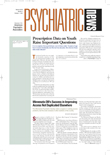With patient safety issues rapidly gaining prominence on the national health care agenda, APA has teamed up with three other concerned organizations to develop a publication that describes strategies for reducing the use of seclusion and restraint.
The 42-page booklet, titled “Learning From Each Other: Success Stories and Ideas for Reducing Restraint/Seclusion in Behavioral Health,” was created by APA, the American Psychiatric Nurses Association, and National Association of Psychiatric Health Systems, with support from the American Hospital Association’s Section for Psychiatric and Substance Abuse Services.
The resource guide is organized as “a compendium of strategies that direct care providers and administrators may want to consider” as they evaluate their facilities’ policies and procedures regarding use of restraint and seclusion, according to a press release from the four groups.
The document stresses the crucial need to involve families and consumers in policy planning around this issue and should assist those same groups in understanding clinicians’ thought processes as they assess circumstances in which restraint or seclusion might be appropriate.
Material for the publication was compiled from literature reviews, structured interviews with members of the sponsoring organizations, and ideas solicited from other experts in the mental health care field. It includes lists of resources and publications to which professionals and others can turn to get further information on the topics discussed.
Sample checklists and assessment forms are also included in the document.
The release of this publication comes at a time when there is pressure from the regulatory, accreditation, and legislative fronts to minimize use of these often controversial procedures.
“The purpose of this project is to identify a body of high-quality clinical and operation information related to restraint and seclusion that can be recommended to the field,” said Charles Riordan, M.D., chair of the APA Committee on Standards and Survey Procedures.
Jane White, R.N., D.N.Sc., executive director of the American Psychiatric Nurses Association, noted that the publication “is full of ideas for creative approaches that both clinical and administrative staff members can take to maintain a culture of safety that will lead to improved patient satisfaction and improved quality of care.”
APA has made the publication available at no cost on its Web site at www.psych.org/clin_res/learningfromeachother.cfm. ▪
